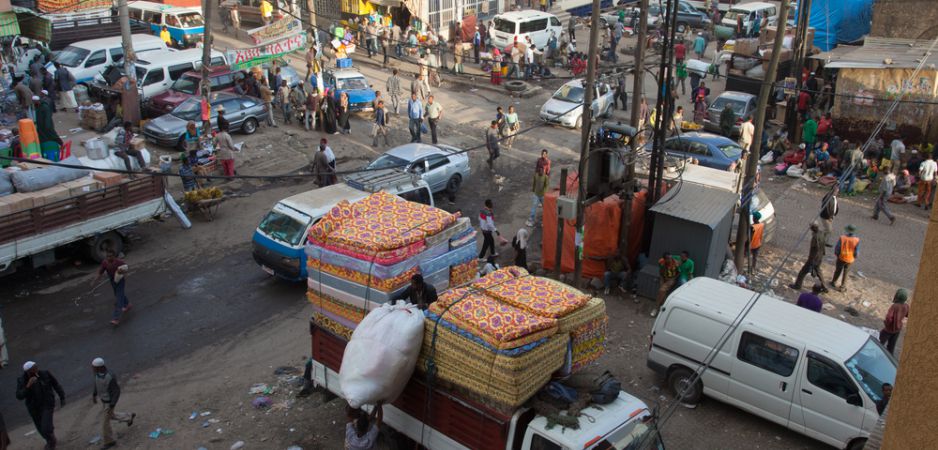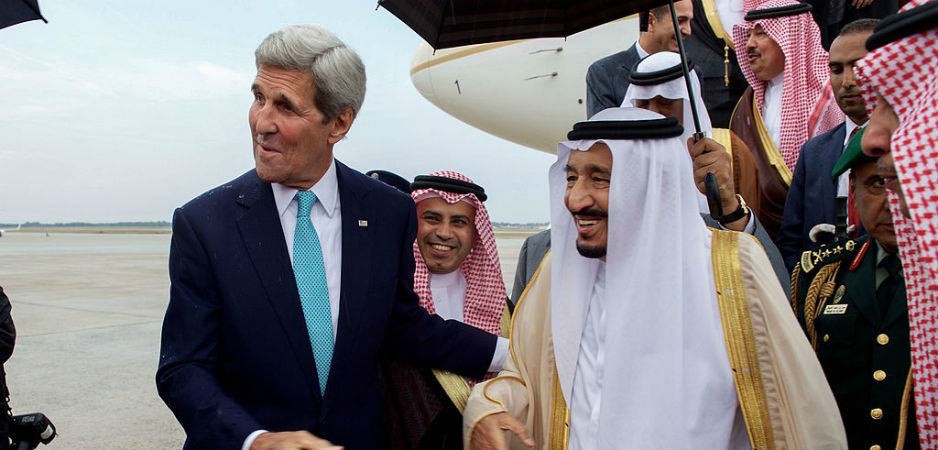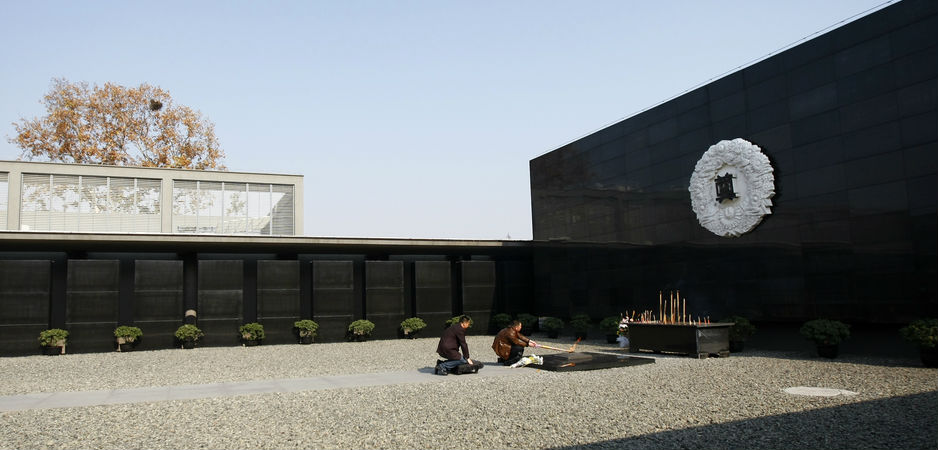Climate change is causing extreme weather conditions, which are a wake-up call for humanity to come up with new ways to live.
This is the last weekly account of 2015 that this author is penning. It has been written on a train speeding through India’s arid state of Rajasthan. In such a dry part of the world, it is no surprise that people talk about water. These days the conversation about water has become more animated. At rivers, tanks and other local water bodies, people point out levels of yore. Traditional water harvesting methods have fallen into disuse, water levels in tanks are dropping alarmingly and people have to dig ever deeper as groundwater gets depleted every passing year.
It is not just water that is the subject of conversations. Rajasthanis are emulating the English and talking about the weather. Farmers complain that it does not rain as much anymore. They say that the seasons are less predictable. Summer can begin early and winter often comes late. Besides, it is often unseasonably warm or cold. Both crops and livestock are affected, as are the flora and fauna. They talk about how agriculture has become trickier because of increasingly erratic weather. Older people say that Rajasthan’s climate has changed dramatically during their lifetime.
It is not just rustic Rajasthan that worries about climate change. Other parts of the world worry as well. This week, extreme weather conditions have dominated news headlines. In the US, at least 25 have died after tornadoes and heavy rains lashed several states. Even as the dead were still being counted, a new storm hit Texas. In South America, vast areas in Paraguay, Uruguay, Argentina and Brazil are suffering the worst flooding in 50 years. Consequently, more than 150,000 people have been evacuated. Even the green and blessed isle of England is experiencing “unprecedented” flooding in Yorkshire and Lancashire. With rivers overflowing their banks in northern England, a relatively temperate place is facing the wrath of the weather gods too.
This author pointed out not too long ago that climate change presents a clear and present danger. It is obvious that human beings can no longer continue to live as they do. In Jaipur, India, the traffic from the city center to Amer Fort, a historic hilltop abode of the former local king, moves at a snail’s pace. On the days that tourists arrive in droves from Delhi, it often comes to a standstill.
From nearby hilltops, anyone can see the urban sprawl of Jaipur. It takes up every bit of low-lying land available. The channels through which rain water flowed to reach reservoirs have now been blocked. Cars, shopping malls and new apartments proliferate even as green spaces disappear. Even places like Jaipur’s posh Central Park are littered with plastic bottles, food wrappings and other rubbish. This is worrying because Jaipur is one of the cleaner cities of India.
Other parts of India are withering away because of waste. Indian rivers are now full of toxic pollutants. After Delhi, the Yamuna is full of human, animal and industrial waste. So are other rivers including the Ganga, supposedly the holiest of all rivers as per Indian mythology.
Driving on Delhi’s roads is an elaborate exercise in cognitive dissonance. Seductive film stars exhort people to buy fancy homes, luxury cars and expensive watches. Yet the traffic barely moves, the air is foul and roads in many neighborhoods are no longer walkable because of increasing numbers of cars parked on both sides. Excess consumption in Delhi has led to huge strains on public infrastructure and the social fabric. A culture of keeping up with the Joneses has developed, where neighbors strive to outdo each other in buying lavish cars or hosting extravagant weddings.
The nearby new town of Noida is teeming with shopping malls that epitomize this frenzied orgy of consumption. Yet the road leading to Noida’s malls is designed for traffic jams. A narrow bridge over an open black drain holds up thousands of cars every day. The cars are a menace and so is the drain. It flows by the fancy malls, the glamorous film city and numerous residential areas. It goes on to discharge untreated sewage and industrial effluents into the Yamuna. Children in nearby neighborhoods complain of asthma. Many older people have breathing problems. People further downstream talk about how the Yamuna is turning their soil toxic. Yet the poisoning of the rivers continues unabated in a culture besotted with Bollywood, cricket and petty politics.
India is not alone in chasing the El Dorado of economic growth and conspicuous consumption. China’s tryst with explosive growth has come at a toxic price with pollutants poisoning its air, water, soil, crops and meat. Africans talk of Wabenzi elites that ride in Mercedes Benzes, wear Rolexes and build many a mini-Versailles. They are taking a leaf out of post-communist Russia and privatizing public assets for a pittance. They are also stealing taxpayer money hand over fist.
This model of crony capitalism was pioneered in the heady days after the fall of the Soviet Union. During those days, Francis Fukuyama was proclaiming the end of history and the new dawn of liberal democracy. This nouveau order promised French perfumes, German cars and American fast food for everyone. Instead what happened was theft. Cronies of those in power took over public assets at a laughable fraction of their true value.
The post-Soviet days make England’s 18th century enclosures appear like theft of pocket change. Communism collapsed because the utopian romance of equality for everyone crashed against the hard rocks of Stalinist oppression. In the memorable words of George Orwell, some were more equal than others. The endless lines for bread in Moscow were only a symptom of a broken system and a failed idea. This failed idea was replaced by a supposedly dynamic one. Virile robber barons took over public assets to squeeze greater productivity out of them. In theory, the new capitalism was supposed to benefit everyone. In reality, ruthless criminal syndicates replaced decrepit party bosses.
 The global economic system of today might be reaching an inflection point similar to that faced by the Soviet Union. At the root of the current system is a simple premise: People are better off if they can consume more. Many argue that this is a fundamental human trait, which enables us to grow crops, settle cities and build rockets. They claim that greater consumption makes people happier. They also assert that the price of progress is inequality. People want bigger homes, fancier cars, lusher lawns and so on and so forth. The only way this can be achieved is through a Darwinian system of competition where the miracle of markets through Adam Smith’s “invisible hand” leads to a bountiful world. The butcher, the brewer and the baker can produce more through specialization of labor and benefit more by trading with each other.
The global economic system of today might be reaching an inflection point similar to that faced by the Soviet Union. At the root of the current system is a simple premise: People are better off if they can consume more. Many argue that this is a fundamental human trait, which enables us to grow crops, settle cities and build rockets. They claim that greater consumption makes people happier. They also assert that the price of progress is inequality. People want bigger homes, fancier cars, lusher lawns and so on and so forth. The only way this can be achieved is through a Darwinian system of competition where the miracle of markets through Adam Smith’s “invisible hand” leads to a bountiful world. The butcher, the brewer and the baker can produce more through specialization of labor and benefit more by trading with each other.
Smith’s world sounds excellent in theory but starts falling apart when there are slave owners and slaves, masters and serfs, and the superrich and slum dwellers. Trade is now no longer possible. The only thing that a purportedly free underclass can trade is its labor. The rich are far too few to require the services of all of the poor anyway. After all, there is a limit to the number of chauffeurs, butlers and nannies the rich can hire. Besides, endemic poverty dehumanizes the poor. African American neighborhoods in Detroit, favelas in São Paulo and shanty towns in South Africa are trapped in a vicious cycle of deprivation, poor education and gang violence. Smith’s blind devotees could do well to remember that he was a product of the Scottish Enlightenment in an egalitarian Presbyterian society. He also advocated public education, a fact conveniently ignored by American Republicans and Englishmen who study at Eton.
Smith’s world of butchers, brewers and bakers plying their trade no longer exists. Their work is now carried out by poorly paid workers for low wages. Giant supermarkets and big brand names now dominate. Concentration of capital has killed the independent trader and the small businessman, particularly in countries like the US and the UK. Most American towns look the same with McDonald’s, Staples and Walmart beckoning those driving by. Capital chases ever higher returns and the name of the game is scaling up. People consume like gluttons, looking for ever cheaper deals. Hence, it is perfectly reasonable to cut down all trees for furniture and clever to pay people minimally to do so.
In this Darwinian system, the quest for ever-higher returns forces business to cut costs to the bone. To boost shareholder returns, it makes sense to discharge industrial effluents straight into the river instead of investing to make effluents less toxic. Strip mining for gold or drilling in the Arctic for oil is rational action regardless of the risks. Those who complain are woolly headed romantics, lacking the toughness and single-mindedness to succeed. Economists, the high priests of this global system, call everything that cannot be captured by the market “externalities.” This word supposedly captures collapse of public institutions, the death of rivers, the damage to people’s health and anything else. To use an oft-used phrase, we live in a world where we know the price of everything and the value of nothing.
The truth is that with over 7 billion people on the planet, unfettered consumption is criminal. Extreme weather conditions are a wake-up call for humanity to come up with new ways to live. Forests and rivers matter, as do social cohesion and personal fulfilment. Other species have the same right to survive and live on the planet as human beings do. Life is more than stuff and humanity has to think beyond markets.
*[You can receive “The World This Week” directly in your inbox by subscribing to our mailing list. Simply visit Fair Observer and enter your email address in the space provided. Meanwhile, please find below five of our finest articles for the week.]
The Dangerous Job of a Human Rights Defender
The life of a human rights defender can be very lonely and isolated.
Growing up, I was exposed to courageous feminists from Pakistan, the Middle East and India when my father would gather artists and intellectuals from different parts of the world in our home for discussions about world politics, human rights and social justice. As a young girl, I was inspired and moved by these women, mesmerized by their courage, kindness and fearlessness. Women who were larger than life speaking truth to power, regardless of the personal costs. I was in awe of what they stood for, but at that time I had very little sense of the danger they were in.
However, over the years, I have come to realize that being a lawyer, journalist, artist or trade unionist can be a job with more risk of physical injury than working in a mine or construction site—if those legal, literary or organizational skills are directed at securing human rights.
It is those who work to secure the human rights… Read more
Development and Human Rights at Odds in Ethiopia
In Ethiopia, authoritarian “development” overlooks human rights and responds to dissent with violence.
In Addis Ababa, Ethiopians should be feeling excited. The city has proudly and successfully debuted the first metropolitan rail line in Sub-Saharan Africa. At the same time, the nearly 800 kilometer train from Ethiopia’s capital city to the port of Djibouti has just begun, which should expand global market integration and trade throughout Ethiopia.
Nevertheless, there is no peace. As many as 100 people have been killed by police and military forces across the country since November. Protests against the “master plan” to expand the city of Addis into the surrounding Oromo region have been met with violent retaliation by government forces.
The latest recent round of unrest began over three weeks ago when students in Ginci staged demonstrations in response to the clearing of a stadium and a nearby forest for development by foreign investors. According to reports on social media, Ethiopian authorities responded with disproportionate force, which then triggered mass demonstrations and more police killings across… Read more
Saudi Arabia’s Anti-Terror “Coalition” is a House of Cards
With differing interests, the Saudi-led anti-terror coalition is unlikely to weaken the Islamic State.
On December 15, Saudi Arabia’s young and inexperienced defense minister announced a military coalition made up of nearly three dozen mainly Sunni Muslim states, stretching from Morocco to Bangladesh. The Saudi-led alliance’s stated purpose is to defeat global terrorism in five nations: Afghanistan, Egypt, Libya, Iraq and Syria.
Mohammad bin Salman’s announcement followed months of increased pressure from US officials on Arab Gulf nations to fight Daesh (“Islamic State”) more forcefully. However, given the conflicting interests and lack of military experience on the part of the coalition’s members, there is ample reason to conclude that this alliance lacks substance.
The Saudi-led coalition includes Bahrain, Bangladesh, Benin, Chad, Comoros, Cote d’Ivoire, Djibouti, Egypt, Gabon, Guinea, Jordan, Kuwait, Lebanon, Libya, Malaysia, Maldives, Mali, Mauritania, Morocco, Niger, Nigeria, Pakistan, Palestine, Qatar, Senegal, Sierra Leone, Somalia, Sudan, Togo, Tunisia, Turkey, the United Arab Emirates and Yemen.
A number of these nations are failed states or just above that classification, beset by their… Read more
History is Being Rewritten in East Asia
China, South Korea and Japan need to be more honest about their own history if they want peace and stability.
The Nanjing Massacre. “Comfort women.” Did the Chinese communist forces beat imperial Japan or the nationalists? And who really owns the islands known in Japan as Senkaku and in China as Diaoyu?
Yet if there is one thing that China, South Korea and Japan can agree on, it’s that history is a powerful tool that can be used to manipulate their own respective populations.
History is a sensitive subject in East Asia. It is little wonder, then, that Seoul erupted into protest on November 14 over the decision by the government of President Park Guen-hye to make drastic revisions to how history is taught in South Korea’s schools. Tens of thousands of demonstrators marched through the streets of downtown Seoul after the announcement that South Korea’s history textbooks would be replaced with a single officially sanctioned textbook that all high schools will use from 2017.
It is not the first time South Korea has imposed… Read more
Is There a Future For Israeli-Palestinian Negotiations?
After two failures by the Obama administration to broker peace, will the Israelis and Palestinians go back to the bargaining table?
In early December, US Secretary of State John Kerry issued a stark warning to the leaderships of Israel and Palestine on the urgency of resuming face-to-face negotiations and reaching a final settlement. His comments came after recent visits to Ramallah and Jerusalem, and in an appearance before the Saban Forum in Washington, DC.
Kerry warned that the Palestinian Authority (PA) is under risk of collapse. Were that to occur, Israel would have to assume the responsibility of administering all of the West Bank and, in theory, Gaza; although Hamas presumably would make that problematic if not nearly impossible at the moment without provoking yet another violent clash between Israel and Hamas.
Kerry is correct that without the PA, Israel would have to take on an enormous burden, no doubt costing billions of dollars and requiring the insertion of additional Israeli security forces as well as hundreds of administrators… Read more
The views expressed in this article are the author’s own and do not necessarily reflect Fair Observer’s editorial policy.
Photo Credit: Solarseven / Shutterstock.com
 We bring you perspectives from around the world. Help us to inform and educate. Your donation is tax-deductible. Join over 400 people to become a donor or you could choose to be a sponsor.
We bring you perspectives from around the world. Help us to inform and educate. Your donation is tax-deductible. Join over 400 people to become a donor or you could choose to be a sponsor.
Support Fair Observer
We rely on your support for our independence, diversity and quality.
For more than 10 years, Fair Observer has been free, fair and independent. No billionaire owns us, no advertisers control us. We are a reader-supported nonprofit. Unlike many other publications, we keep our content free for readers regardless of where they live or whether they can afford to pay. We have no paywalls and no ads.
In the post-truth era of fake news, echo chambers and filter bubbles, we publish a plurality of perspectives from around the world. Anyone can publish with us, but everyone goes through a rigorous editorial process. So, you get fact-checked, well-reasoned content instead of noise.
We publish 2,500+ voices from 90+ countries. We also conduct education and training programs
on subjects ranging from digital media and journalism to writing and critical thinking. This
doesn’t come cheap. Servers, editors, trainers and web developers cost
money.
Please consider supporting us on a regular basis as a recurring donor or a
sustaining member.
Will you support FO’s journalism?
We rely on your support for our independence, diversity and quality.











